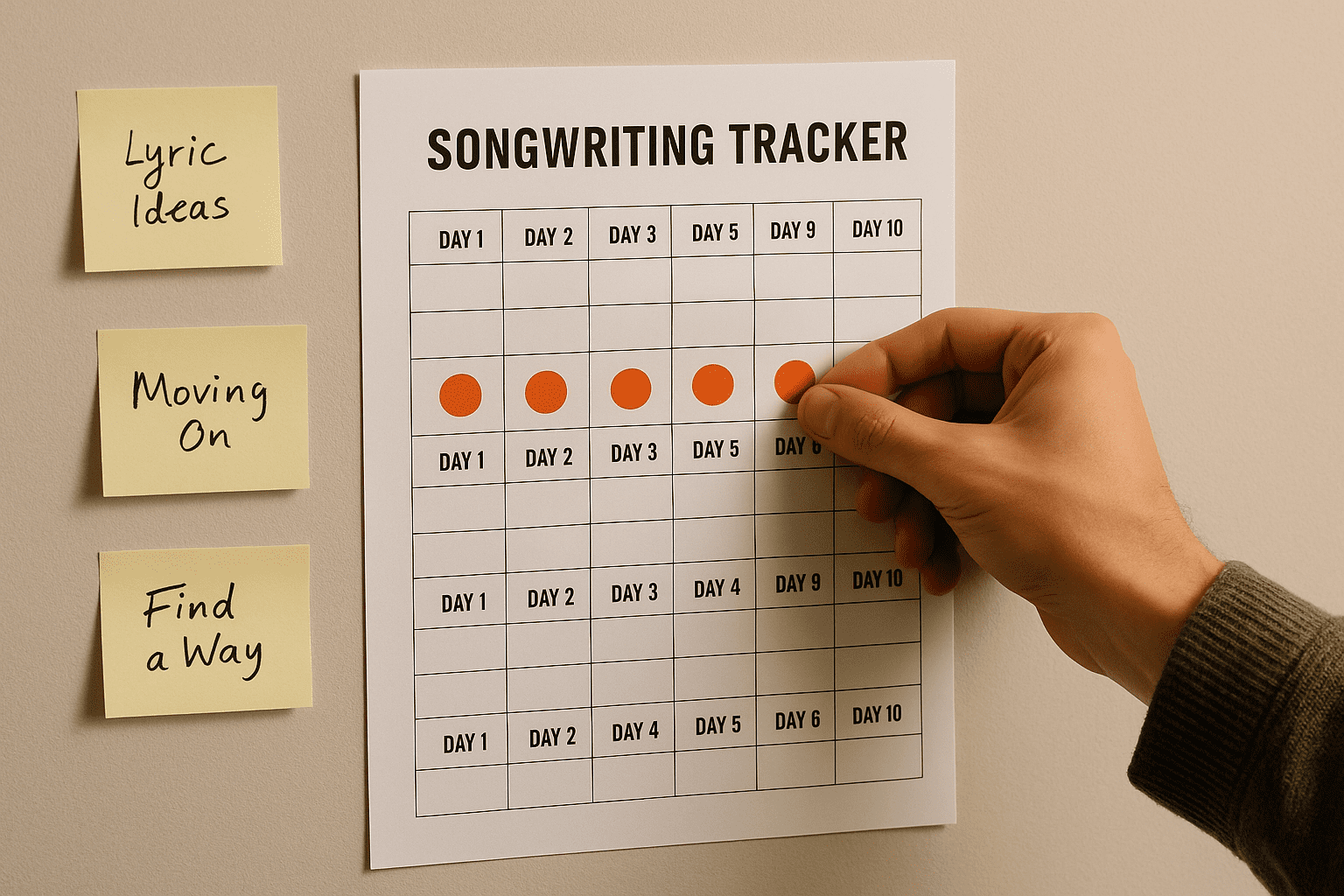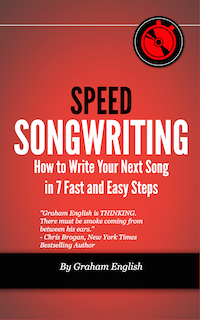
You don’t need a three-hour morning ritual, a fancy studio, or a surge of divine inspiration to finish songs consistently.
You need a rhythm. A repeatable groove that fits into your life, like coffee in the morning or brushing your teeth before bed.
It’s not about having endless hours. It’s about using the time you do have—on purpose.
Below are seven concrete routine hacks that help you start, stick, and finish—no matter how busy or blocked you feel.
1. Anchor Your Writing to Something You Already Do
Start by attaching your writing to a habit that already happens automatically.
That might be:
- After your morning coffee
- Right after you walk the dog
- As soon as you close your laptop at the end of work
You’re not adding something new to your schedule—you’re piggybacking on something your brain already recognizes.
To get started, follow these 3 simple steps:
- Pick one action you do every day (make coffee, brush your teeth, open your laptop).
- Decide on a short creative behavior you’ll do immediately after it (open voice memo app, write one lyric line, hum a melody).
- Celebrate it—yes, actually smile or nod or say "Boom!" aloud.
This is a core part of the Tiny Habits method. You’re not waiting for motivation—you’re programming momentum.
2. Use a 3-Minute Warm-Up to Kill the Blank Page
One of the biggest obstacles to consistency? Staring at the void.
Don’t start your session cold. Prime your brain with a short, creative warm-up.
Here’s what to do next:
- Set a timer for 3 minutes
- Freewrite lyrics using a random word prompt (like “mirror” or “river”)
- Or play random chords and hum nonsense melodies
The point isn’t brilliance—it’s ignition.
Think of it like tuning your instrument. Your voice. Your mindset. You’re signaling: “It’s writing time now.”
Keep a separate notebook or folder called “Warm-Ups.” You’ll be surprised how often these scraps become full songs later.
3. Pre-Decide What You’ll Work On (The Night Before)
When the clock’s ticking and your brain’s fried, decision fatigue kills creativity.
You need a plan before you sit down.
Each night, take 30 seconds to write a sentence like:
- “Tomorrow, I’ll sketch a chorus idea for that soulful ballad.”
- “Tomorrow, I’ll polish the verse for ‘Running Blind.’”
- “Tomorrow, I’ll record a scratch melody for the second verse.”
One clear target. No ambiguity.
Keep a sticky note on your keyboard, or set a phone reminder with that sentence. You’ll glide into your session like a plane landing on autopilot.
4. Limit Your Session to 20 Minutes (Yes, Seriously)
Short bursts create long-term consistency. You don’t need two hours—you need twenty focused minutes.
Set a timer. When it goes off, stop.
This constraint does two things:
- It removes pressure to be perfect.
- It makes it easy to return tomorrow.
You’re no longer trying to squeeze a full masterpiece out in one sitting. You’re laying bricks—one solid chunk at a time.
Over a week, those 20-minute bricks build something real:
- Monday: freewrite ideas
- Tuesday: sketch a melody
- Wednesday: write a verse
- Thursday: edit it
- Friday: record a rough demo
Instead of obsessing over one chorus for three hours, you’ll actually move.
5. Use a Rotating 3-Day Cycle to Stay Fresh
If you get bored easily or stuck on one song for too long, use this rotation system:
Day 1 – Start Something New
Brainstorm titles. Sketch melodies. No pressure to finish—just generate.
Day 2 – Move an Existing Song Forward
Pick something you started recently. Add a verse. Refine a melody. Build on it.
Day 3 – Finish or Archive
Decide: Is this worth finishing? If yes, tighten it. If no, save and move on.
This cycle keeps you creatively fresh without getting scattered. You always know what kind of energy to bring to each day. New, build, or wrap.
6. Keep a “Next Line” List in Your Notes App
Ever had a lyric pop into your head while driving or doing dishes?
Capture it. But more importantly, label it as a “next step.”
In your Notes app or songwriting journal, start a running list:
- “Next hook idea: ‘I don’t break—I bend like wire’”
- “Next bridge topic: childhood flashback”
- “Next title idea: ‘Quiet When I’m Loud’”
When you sit down to write, you’re not starting from zero. You’re grabbing from a stack of seeds.
It’s like walking into the garden and seeing the pots already lined up, ready to plant.
7. Track Your Wins (Even the Tiny Ones)
Creativity loves evidence. If your brain doesn’t see progress, it’ll assume you’re stuck.
So, create a simple log:
- ✅ Wrote a chorus idea
- ✅ Edited two lines
- ✅ Recorded scratch melody
Use a whiteboard, spreadsheet, or sticky notes. Make it visual.
And once a week, look back. You’ll realize, “Wow, I actually made progress every day.” That feeling snowballs.
You don’t need a finished song every time. You need movement. Tiny steps count—when you track them, they stack.
Final Thoughts
None of these hacks requires you to be a full-time musician.
They don’t require perfect circumstances, a fancy mic, or four uninterrupted hours.
They only require one thing:
Commitment to show up—in small, doable ways—every single day.
Start with just one hack today.
Tomorrow, stack on another.
In a week, you’ll feel like someone entirely different:
A songwriter who finishes what they start.
Want a plug-and-play system to guide your daily writing?
👉 Check out the Speed Songwriting Video Guide — and turn these hacks into your creative engine.

Enter your first name and email address below and click “GET ACCESS NOW!” to get the Speed Songwriting Cheat Sheet delivered to your inbox!
We guarantee 100% privacy. Your information will not be shared.

Leave a Reply